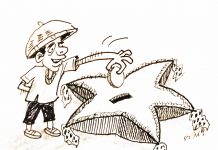
ASSOCIATE PROFESSOR III
Like the proverbial chicken and egg, Inflation and Corruption is often concepts written side by side.
Inflation in the Philippines has been fluctuating in 2023. According to the Philippine Statistics Authority, headline inflation or the overall inflation in the Philippines slowed down further to 6.1 percent in May 2023 from 6.6 percent in April 20231. In January 2023, the country’s headline inflation rate increased to 8.7 percent from 8.1 percent in December 20222. The main driver of inflation in January was housing, water, electricity, gas, and other fuels, with an inflation of 8.5 percent 2.
In terms of corruption, the Philippines ranked 116th in Transparency International’s Corruption Perception Index (CPI) for 2022, which assesses the perceived levels of public sector corruption in 180 countries and territories globally3. The country’s latest CPI score was 33, unchanged from the previous year and its lowest score in the index3. Transparency International still lists the country as among the “significant decliners” in the Asia-Pacific region3.
Corruption is a complex issue that is difficult to address. While the Philippine government has implemented strategies to foster higher levels of integrity and prevent corruption4, it remains a challenge to completely eradicate corruption. It is important for governments to continue to work towards improving transparency and accountability to combat corruption.
Inflation in the Philippines can have serious economic and social implications. Inflationary impacts are felt across all sectors of society, as prices rise and wages fail to keep up with the rate of inflation. This leads to an increase in the cost-of-living, resulting in an overall decrease in purchasing power for consumers1. Lifestyles are forced to change as prices continue to soar, with most Filipinos lowering their standards of living1. Those that rely on their fixed incomes now have to find other sources of income or they run the risk of having insufficient funds for sustenance1. Inflation can also lead to hoarding, social unrest, and revolts1.
However, there are ways to manage the effects of inflation, such as planning, exploring other sources of income, reducing expenses, and venturing into investments1. The Philippine economy has also shown resilience in the face of inflation. For example, GDP grew at a faster-than-expected 6.4% in the first quarter of 2023 despite elevated inflation and the central bank’s aggressive monetary tightening.
Corruption in the Philippines has serious effects on public trust and political institutions, hindering democratic socialization and inclusion1. Corruption can also lead to loss of public spending and hinder investment and economic growth1. It is a pervasive problem in the country, with charges of corruption, graft, and cronyism common among government officials at all levels1.
For Philippine business leaders, corruption is the top risk to economic recovery, trumping inflation and rising oil prices2. A survey conducted by the Management Association of the Philippines with PwC showed that 67% of CEOs say corruption could delay economicr ecovery, while lower investments and political uncertainty are next among their worries2.
In terms of morality, corruption is a failure of public ethics, and generally holds back growth and progress3. Since the late 1990s, the “ethics barometers” of both the World Bank and Transparency International have indicated that the overall quality of Philippine public ethics has slipped3. Corruption has always been linked to dishonesty and “dirtiness”4. In fact, one of the most prevalent effects of corruption in the Philippines is giving fuel to the belief that politics is inherently dirty4.
In all, corruption affects inflation and creates problems for the country.



